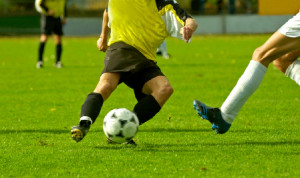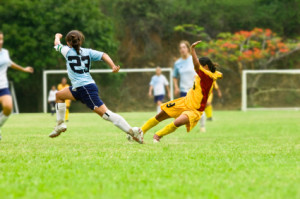Parent's Resources
9 THINGS GOOD SPORTS PARENTS AVOID
THEY DON’T OVERREACT TO INJURIES.
Sports are physical and there are going to be times when your kid goes down, gets hit by an elbow or a ball and looks like they are in a lot of pain. Remember a good 90 percent of the time it’s not serious, which means parents don’t need to be running onto the field or the court or the ice like they are a member of the team’s training staff. If you trust your coach, which hopefully you do, let him or her be the first responder. Coaches and referees will call upon you if they need you. In the event that it is a serious injury, a broken bone, a concussion, knocked out teeth, what’s most needed in the situation is a parent who can stay calm and make rational and reasonable decisions.
THEY DON’T USE “I TOLD YOU SO’S” AND “YOU SHOULD HAVE DONES.”
When your child makes a mistake or doesn’t perform, view those as beautiful teachable moments. Let’s say your 9-year-old loses his baseball glove. Instead of shaming him by saying “I told you to put it in your bag” or fixing it by running to the store and buying a brand new one, help your child learn about responsibility. Take him back to the field and show him how to retrace his steps so he might find his missing glove or take him with you to buy a new one and allow him to contribute some of his allowance or savings towards the purchase. I guarantee your children will take better care of their belongings when they have a true understanding and investment of how much work it takes to care for them and how much they actually cost. Which brings us to …
THEY DON’T OVERINDULGE IN EQUIPMENT.
I know there is a compelling argument to be made for why your child needs the $200 pair of Jordans or the $350 baseball bat, but here’s the deal … First, equipment won’t make your child a better athlete. Second, children learn to appreciate what they have, by not having it. It may feel like you are making your child happy by buying them things they ask for, but that instant gratification is fleeting for both of you. When children have to wait or work hard for something, they actually appreciate it more when they finally get it.
[RELATED ARTICLE: WHY COACHES HATE OVER INVOLVED PARENTS]
THEY DON’T FOCUS ON FAILURE.
When your child is presented with new things you want them to be challenged rather than intimidated because all they can see are the limitations. If they immediately think they aren’t going to be good at something, they are less likely to try it. Good sports parents use encouraging words like, “You are a hard worker,” or “I love how you stood on base, even though you said you were scared of the ball hitting you,” to help instill a sense of belief in their children that they’re capable of succeeding at a given task.
[YOU MIGHT ALSO LIKE: 7 WORST THINGS PARENTS DO TO YOUNG ATHLETES]
THEY DON’T ORCHESTRATE THEIR CHILDREN’S TEAMS.
Children learn incredible lessons from being around people who are different. There’s nothing wrong with trying to organize a team with families and kids you enjoy, but if you are blackballing children less athletically talented to create all-star super teams that will win, you are kind of missing the whole point. Sports are one of the best places in the world for your children to learn about tolerance and celebrate differences. Good sports parents don’t grumble when they find out they got “that kid” on their team because they understand that the impact and value in celebrating a little boy who hasn’t been able to hit a baseball get on base for the first time will teach your children far more important lessons than winning a championship ever will.
THEY DON’T SUGAR COAT.
Piling on the praise every time your child performs a simple task actually makes them less motivated to perform it in the future. Children get it when they don’t perform well and they expect that you do too. It’s okay for them to feel disappointed or frustrated and as parents we have to learn how to be okay sitting with their emotions and not taking them on as our own.
THEY DON’T COMPARE THEIR KID TO OTHERS.
It’s normal to notice the skills and talents of other children and gauge how your child measures up. But if we know that no two children are exactly alike, then how does it possibly make sense to compare them? What motivates your child’s teammate isn’t the same for your child. Your child might not be as physically developed as another child and has different genes that will determine height and speed. Comparing children lowers their self-esteem and self worth. So instead of comparing points scored or goals blocked, try to appreciate and focus on effort and on some of your child’s specific strengths. It can be something small, like, “I loved how you stood up and high fived your teammate after he scored. That was a really nice way to show your support.”
[RELATED ARTICLE: MY PARENTS MADE ME INTO A PROFESSIONAL ATHLETE]
THEY DON’T COMPETE THROUGH THEIR CHILDREN.
If you are in a really bad mood when your child loses a game or you yell at your child to swing quicker, run faster, focus, chances are you are overly invested in your kid’s sport and you are competing with others through your child. I think most of us are living vicariously through our children on some level to cover up or correct disappointments we feel about our own lives. I know I tell myself things like, “I would have been a better athlete if my mom and dad had been more involved or I would have played sports in college if I had the same opportunities my kids have.” When you find yourself desperately wanting your child to win or perform better than they did, you need to ask yourself why. Is it because you are trying to compensate for your own deficiencies? I’m guessing it’s because having your child excel at something makes you feel better about yourself.
THEY DON’T FORGET TO ENJOY THE PROCESS.
One day you are going to look back and miss your innocent 7-year-old squatting in the outfield digging for bugs in the middle of a baseball game or your daughter being more excited about the post-game snack than the soccer game. You are going to miss all the driving, the schlepping, and the smelly equipment. You know the saying, it’s about the journey, not the destination? In youth sports that couldn’t be truer. The chances your child’s youth sports career will lead to a college scholarship or a job as a professional athlete are slim. So don’t make all of this craziness just about a destination that’s nearly impossible to get to, instead really, truly focus on enjoying the trip!





